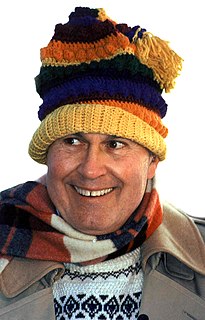A Quote by Frances Moore Lappé
What was so moving for [Diane Wilson], and also for me, is that she felt the Bay itself was like her grandmother. She said, "I don't think there's a woman alive who would give up fighting for her child, or her mother, or her grandmother."
Related Quotes
I heard a story about a woman who grew up in Texas. When she was having trouble in her life, she would visit her grandmother, who lived nearby and always had a kind word and some wisdom to pass on. One day she was complaining to her grandmother about some situation and her grandmother just turned to her, smiled sadly, and said, "Sometimes, darlin', you've just got to rise above yourself in this life." I've remembered that wise advice many times as I've faced trouble in my life.
It's right around this time that her Grandmother Hall dies. And Eleanor Roosevelt is responsible for making all the funeral arrangements. And there are a couple of things that she really understands, as she contemplates her grandmother's life and makes the funeral arrangements. One, she's really talented, an organizational woman. She knows how to do things. She begins to compare her life to her grandmother's life. And it's very clear to her that being a devoted wife and a devoted mother is not enough.
Blaire, This was my grandmother’s. My father’s mother. She came to visit me before she passed away. I have fond memories of her visits and when she passed on she left this ring to me. In her will I was told to give it to the woman who completes me. She said it was given to her by my grandfather who passed away when my dad was just a baby but that she’d never loved another the way she’d loved him. He was her heart. You are mine. This is your something old. I love you, Rush
Hazel has to realize that her mom was wrong when she said, “I won’t be a mother anymore.” The truth is, after Hazel dies (assuming she dies), her mom will still be her mom, just as my grandmother is still my grandmother even though she has died. As long as either person is still alive, that relationship survives. (It changes, but it survives.)
Sometimes we adopt certain beliefs when we're children and use them automatically when we become adults, without ever checking them out against reality. This brings to mind the story of the woman who always cut off the end of the turkey when she put it in the oven. Her daughter asked her why, and her mother responded, "I don't know. My mother always did it." Then she went and asked her mother, who said, "I don't know. My mother always did it." The she went and asked her grandmother, who said, "The oven wasn't big enough."
Well, when Eleanor Roosevelt's mother dies, she goes to live with her Grandmother Hall. And her Grandmother Hall is in mourning. She's in widow's weeds. She's in her 50s, but appears very old. And she's exhausted from raising rather out-of-control children. Her favorite daughter, Anna, has died (Eleanor's mother), and she has living at home two other sons, Vallie and Eddie. And they are incredible sportsmen, incredible drinkers, out-of-control alcoholics.
I asked my grandmother how a Hungarian Jewish person can experience being Jewish. My grandmother answered was the only choice was to "keep quiet." I can understand her because she was a Holocaust survivor, and for her survival, she had to keep quiet. But I didn't obey my grandmother when I was a child, and in this case, I don't obey her either.
My mother didn't feel sorry for herself, she was left with no child support, no alimony at a very young age, with a child to raise, a high school education and she just figured it out. She didn't complain, she didn't rely upon government, she relied upon her own skill set, her own self confidence, her own drive in moxie and her own duty to me and her and she relied upon her family and her faith.
At a certain point the family moved to Jaipur, where no woman could avoid the doli or purdah. They kept her in the house from morning to night, either cooking or doing nothing. [My mother] hated doing nothing, she hated to cook. So she became pale and ill, and far from being concerned about her health, my grandfather said, 'Who's going to marry her now?' So my grandmother waited for my grandfather to go out, and then she dressed my mother as a man and let her go out riding with her brothers.
One thing I did have under my belt was, my mother lost her mother when she was 11. She mourned her mother her whole life and made my grandmother seem present even though I never met her. I couldn't imagine how my mom could go on but she did, she took care of us, she worked two jobs and had four children. She was such a good example of how to conduct oneself in a time of grief. When I lost my husband, I tried to model myself as much as I could on her.
so my grandmother was not without humanity. and if she wore cocktail dresses when she labored in the garden, they were cocktail dresses she no longer intended to wear to cocktail parties. even in her rose garden she did not want to appear underdressed. if the dresses got too dirty from gardening, she threw them out. when my mother suggested to her that she might have them cleaned, my grandmother said, "what? and have those people at the cleaners what i was doing in a dress to make it that dirty?" from my grandmother i learned that logic is relative.
I think her Grandmother Hall gave her a great sense of family love, and reassurance. Her grandmother did love her, like her father, unconditionally. And despite the order and the discipline - and home at certain hours and out at certain hours and reading at certain hours - there was a surprising amount of freedom. Eleanor Roosevelt talks about how the happiest moments of her days were when she would take a book out of the library, which wasn't censored.
































